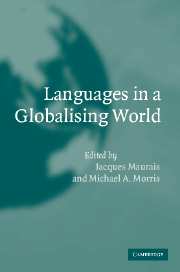Book contents
- Frontmatter
- Contents
- List of figures
- List of tables
- Notes on contributors
- Acknowledgements
- 1 Introduction
- Part I Global communication challenges
- 2 Towards a new global linguistic order?
- 3 The geostrategies of interlingualism
- 4 Language policy and linguistic theory
- 5 Babel and the market: Geostrategies for minority languages
- 6 Forecasting the fate of languages
- Part II Major areas
- Part III Languages of wider communication
- Conclusion
- Index
2 - Towards a new global linguistic order?
Published online by Cambridge University Press: 18 November 2009
- Frontmatter
- Contents
- List of figures
- List of tables
- Notes on contributors
- Acknowledgements
- 1 Introduction
- Part I Global communication challenges
- 2 Towards a new global linguistic order?
- 3 The geostrategies of interlingualism
- 4 Language policy and linguistic theory
- 5 Babel and the market: Geostrategies for minority languages
- 6 Forecasting the fate of languages
- Part II Major areas
- Part III Languages of wider communication
- Conclusion
- Index
Summary
There will be, in the twenty-first century, a major shake-up of the global language hierarchy.
Graddol (1997, p. 39)The idea of dedicating a book to languages in a globalising world, i.e. to their relationships and their competition on the world's checkerboard, is the result of a series of events, such as the reunification of Germany, the break-up of the eastern European bloc of countries, the end of apartheid in South Africa and phenomena that are part of a long-term trend, such as the creation of new economic trading blocs and globalisation. Ignacio Ramonet (1999, pp. 19–20) paints the following portrait of events marking the end of the twentieth century:
Events of great import – the unification of Germany: the disappearance of the Communist regimes in Eastern Europe; the collapse of the USSR (from inexplicable causes); the United Nations crisis; the abolition of apartheid in South Africa; the end of ‘smouldering wars’ (EI Salvador, Nicaragua, Angola, Afghanistan, Cambodia); radical change in Ethiopia, Guyana, Chile; the end of the Mobutu regime in Congo-Zaire … ; the mutual recognition of Israel and the Palestinians; the renaissance of China and the return of Hong Kong to China; the emergence of India, etc. –totally change the geostrategy of the planet. Still other slower paced but world-shaking events, like the continuation of European construction, also exert a decisive influence on the general flux of the political life of the world and, at the same time, cause a series of multiple upheavals. […]
- Type
- Chapter
- Information
- Languages in a Globalising World , pp. 13 - 36Publisher: Cambridge University PressPrint publication year: 2003
- 23
- Cited by



